Report Puts In Doubt Envoy’s Claim Over Russia’s Respect For Iran
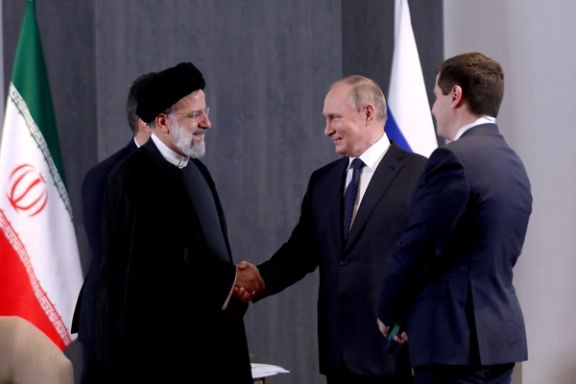
Tehran’s claims about Russia reiterating its support for Iran’s territorial integrity have been put in doubt by a Russian TASS news agency report.

Tehran’s claims about Russia reiterating its support for Iran’s territorial integrity have been put in doubt by a Russian TASS news agency report.
The Iranian ambassador in Moscow and government media claimed Saturday that a senior Russian diplomat had backtracked on Moscow’s earlier endorsement of a territorial claim by the United Arab Emirates, by reiterating support for Iran’s territorial integrity over the Abu Musa, and the Greater and Lesser Tunb islands in the Persian Gulf. Iran's islands are claimed by the UAE as their own.
IRNA, the state news agency soon after claimed that the remarks indicated Russia had revised its position on the three islands. However, a report by the Russian news agency TASS shows the Russian diplomats were simply playing diplomatic chess with Iran, the two countries now firm allies since Iran has become a major supplier of drones and arms for Russia's war in Ukraine.
The TASS report not only mentioned nothing about respect for Iran's territorial integrity, but once again used the word ‘Arab Gulf’ to reiterate the stance of Russia’s foreign ministry expressed earlier.
TASS also quoted the Russian foreign ministry as adding that the senior Russian diplomat received the Iranian ambassador at his request.
Last week Moscow supported the United Arab Emirates’ sovereignty over three contested islands, causing diplomatic friction with Iran. Its loyalties are to the UAE which is one of the only states to still trade with Russia in spite of sanctions. Hundreds of thousands of Russians have flocked to the country since the war broke out last year.
Iran’s foreign ministry summoned Russia's ambassador and Foreign Minister Hossein Amir-Abdolahian and government spokesman Ali Bahadori wrote in separate tweets that "Iran will not compromise over its national interests and territorial integrity."
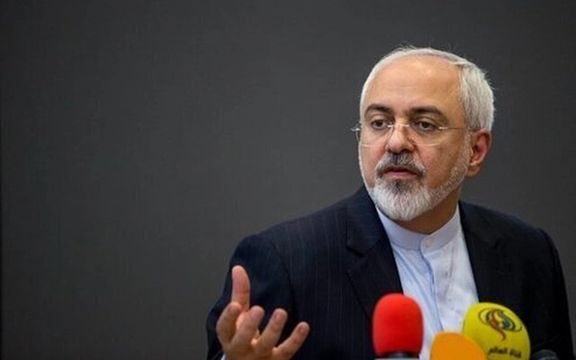
Iran's former Foreign Minister Mohammad Javad Zarif says Tehran has the wrong understanding of its relations with Russia, which is based on miscalculations.
Zarif, who negotiated the 2015 JCPOA nuclear accord with the United States, suggested that Iran should have its strongest ties with China like some 180 other countries in “the current post-western world,” when neither all important events take place in the West, nor it is the West that makes decisions on important developments of the world.
In a speech at the Iranian Society of Political Sciences in Tehran July 12, Zarif said that the end of the Cold War gave rise to the illusion of the emergence of a unipolar world order. "In fact, the years 1990 – 2008 were marked by the illusion of a unipolar world," he said.
The former foreign minister's speech came after a long silence, and it is not clear if the timing of his public appearance carries any particular meaning.
Zarif added that at the time, Russia had lost the Cold War, but the United States did not win it. "We are currently undergoing a period of transition," he said, adding that many politicians in Iran still have the mentality of the Cold War era and expect Russia to play the role it used to play. This is based on a wrong perception and this miscalculation can lead to our destruction.
"Today Russia cannot compete with other powers in any area. The reason why Russia attacked Ukraine was that it wanted other powers to negotiate with it," Zarif said, adding that "Today there is no permanent alliances between countries. Instead, they are replaced with temporary coalitions. Thinking of permanent alliances is a pitfall."

He argued that Iran wrongly thinks Russia can be its ally. Many were surprised when Russia did not veto UN Resolution 1929 against Iran, which set up a fact-finding mission to investigate human rights violations. “But I knew that they were not going to veto it,” Zarif said. However, he insisted: “I am not an anti-Russian person. I believe it is dangerous for Iran to be anti-Russian or anti-US. We should prioritize our national interests and then consider opposing US domination."
Zarif argued that perhaps no new dominating power will emerge. China's point of strength is the power of its trade and technology. He added that we are moving toward a global network rather than a bipolar or unipolar world.
Speaking about the nuclear talks, Zarif said the negotiation has always been a war of narratives between Iran and the United States which did not work well although both Iran and the US narratives were meant to reach an agreement.
Meanwhile, former diplomat Jalal Sadatian also said in an interview on Saturday that "China and Russia simply perceive Iran as a friend and not as a strategic ally and regulate their ties with Tehran based on the same perception."
He observed that Iran unilaterally assumes that countries such as China and Russia are its strategic allies, but those countries do not have such a definition of their ties with Iran.
Sadatian, a former Iranian ambassador in the United Kingdom, said, "This explains why Russia and China sometimes take positions against Iran's territorial integrity. They regulate their relations with Iran based on their own national interests not based on illusions. Therefore, when they see relations with the Persian Gulf Arab states is more beneficial for their interests, they align with those countries rhetoric."
"This means, when they see they can win hefty contracts with Saudi Arabia and the United Arab Emirates they tend to get closer to those countries regardless of our demands and interests," Sadatian explained.
Earlier in the week, in a joint Russia-GCC statement at the sixth joint ministerial meeting between the Persian Gulf Cooperation Council and the Russia, ministers affirmed their support for the United Arab Emirates demand over three Iranian islands.
He added that the third point in this respect is that "the Islamic Republic needs to strike a balance in its ties with East and West in order to benefit from its geopolitical potentials. Iran's constant anti-Western rhetoric will eventually weaken it."
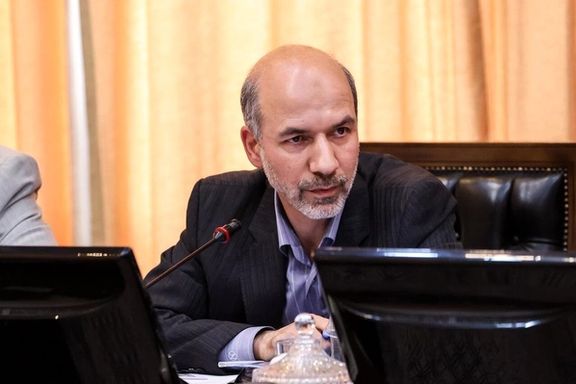
Iran’s energy minister says Tehran will not compromise the rights of the nation regarding its water share from the Hirmand River as it battles with the Taliban.
As the Taliban continues to ignore the threats by the regime and its military authorities regarding Iran's water share, Energy Minister Ali Akbar Mehrabian once more upped the ante against the militant group on Saturday.
"Despite the fact that our water share has not been given, we are taking necessary measures to supply water to the people," he threatened.
Flowing 700 miles, the river - which is called Helmand on the Afghan side - enters Iran's Hamoun wetlands in the Sistan-Baluchestan province after originating in the Hindu Kush Mountains near Kabul. Lake Hamoun used to be one of the world's largest wetlands, straddling 4,000 square kilometres between Iran and Afghanistan.
The river, which both Afghanistan and Iran depend on for agriculture and drinking water, has been the biggest source of tension for years.
Over the years, Iran has accused Afghanistan of restricting the flow of water from the river by building dams over it, a charge that Afghan authorities deny.
This comes as in the past few days, numerous reports have been published about water shortages in different regions of Iran, especially the Sistan and Baluchestan province.
Alireza Ghasemi, the CEO of Sistan and Baluchestan Province Water and Sewerage Company, told IRNA state news agency that the province is facing a water shortage of about 65 million cubic meters per year and all the cities of the province are suffering from water scarcity.
Iran's share from Helmand is 12 times the figure, which the Taliban refuses to give despite threats by Iran.
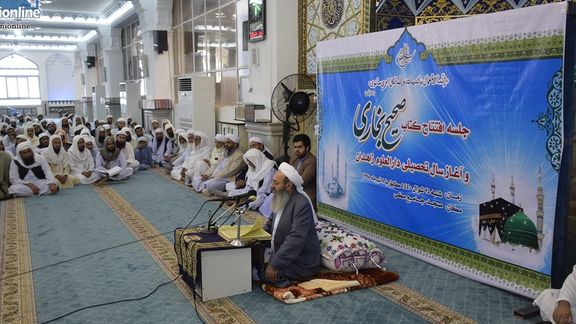
The office of top Sunni cleric Mowlavi Abdolhamid has refuted government allegations that many of the students and teachers of his seminary are in Iran illegally.
“The state media claims that some of the teachers and students of Zahedan Dar ol-Olum [also known as Maki Seminary] have forged their identity documents is absolutely false,” Abdolhamid’s office said in a statement published on his official website Thursday, following a recent mass expulsion.
The state-run television (IRIB) reported Wednesday that authorities arrested 132 preachers who were “foreign nationals” and aired brief interviews with three Afghan men, presumably from among the preachers sent back home, who said they had forged identity documents and entered Iran illegally.
The statement from the Sunni cleric came a day after the Revolutionary Guards (IRGC) linked Tasnim news agency claimed that fifty percent of the students and some of the teachers of Maki Seminary are “foreign nationals” who are illegally residing in the southeastern Sistan and Baluchestan Province.

The expulsion of seminary students was part of government pressure tactics against Abdolhamid who has been a consistent critic of the Shiite clerical regime since 90 protesters were gunned down by security forces in Zahedan on September 30, 2022.
Abdolhamid’s office said the Afghans sent back to Afghanistan were forced to make false statements about forging identity documents and illegal residence in Iran, threatening to reveal details of security forces’ intimidation.
In an attempt to conceal the mass expulsion, Tasnim claimed that a considerable number of seminary teachers and directors with illegal identity documents and forged identities were spared harsh prison sentences and instead sent back to their home country, attributing the reprieve to “Islamic compassion”.
The outspoken, moderate cleric who has become the unofficial voice of the country’s Sunni population - which is roughly 10 percent of the 88 million population - has come under constant pressure from the authorities recently to stop his fiery Friday sermons.
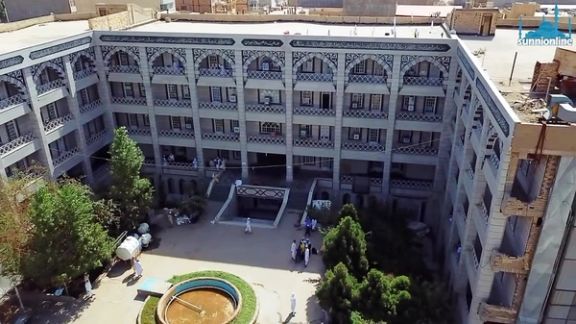
Abdolhamid has criticized the government for funding and controlling religious seminaries and taking away their independence. Iran's government annually allocates hundreds of millions of dollars to Shia religious seminaries and other religious institutions that play the role of its propaganda arm.
Abdolhamid’s call for a referendum with the presence of international observers to decide the future form of government in Iran has massively angered hardliners. He has expressed more liberal views about the role of women in the society after being criticized by some Baluchi activists for not mentioning women and acknowledging equality of men and women in his controversial Friday prayer sermons.
Iranian authorities often refer to citizens of Afghanistan, millions of whom live in Iran as refugees or economic migrants, as “foreign nationals”.
In April 2022, Foreign Minister Hossein Amir-Abdollahian said one million more Afghans had entered Iran since the Taliban took power in August the previous year, bringing the number of refugees and economic migrant to five million.
According to the UN Refugee Agency (UNHCR), only 780,000 of Afghans residing in Iran are recognized as refugees. Most other Afghans are considered economic migrants who have been an important workforce in Iran.
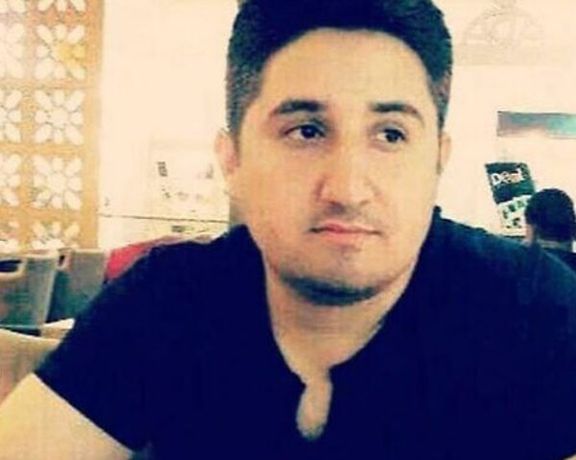
Police in Cyprus confirmed claims by Israel’s Mossad secret service that an Iranian hit squad planned to kill Israelis, the Associated Press reported Saturday.
A security official told the AP that Cypriot police had followed up a tip by “friendly intelligence service” and discovered and Iranian national identified as Yusuf Shahbazi Abbasalilu who was leading the plot.
Mossad released a video in June of the same man being interrogated by its agents and claimed that he was captured in Iran. The video showed him sharing details of his entry into Cyprus through the Turkish occupied north and how he had scoped out the location of the first target for assassination, prepared the weapon and concealed it on word that he must flee just days before the operation.
In the video released by Mossad, he says that the operation was being led by Iran’s Revolutionary Guard, which is listed as a terrorist organization by the United States and faces the risk of also being listed in Europe.
In the past, Israel and Cyprus worked together to foil Iranian attacks on Israelis. Two years ago, an Azerbaijani with a Russian passport, who was acting on behalf of the Iranian Revolutionary Guards, was arrested by Cypriot intelligence services. The hitman was hired to kill an Israeli businessman.
The Associated Press said that Abbasalilu set up base in the Turkish occupied northern part of Cyprus but was sent back to Iran after being identified as a security risk.

Iran's exiled prince Reza Pahlavi, a top opposition figure, has slammed the weakness of the Islamic regime in defending the country's territorial integrity.
In an interview with Kayhan London on Friday, Pahlavi condemned the reaction to Russia's recent claim regarding three Persian Gulf Iranian islands contested by the United Arab Emirates.
Last week, Russia supported UAE sovereignty over three Persian Gulf islands - Abu Musa, the Greater and the Lesser Tunb - causing diplomatic friction with Iran.
“Russia's siding with the illusory claims of the member states of the Persian Gulf Cooperation Council about the three Iranian islands ... shows how the Islamic Republic has auctioned the wealth, soil and territorial integrity of Iran with its unwise and traitorous policies,” Pahlavi said.
Elsewhere in his remarks, the Iranian prince condemned the use of violence against veterans of the Iran-Iraq war, who had gathered in front of the Foundation of Martyrs and Veterans Affairs in Tehran, to protest hardship amid a 100-percent food price inflation and their inadequate pensions.
“Like other foundations and headquarters under the control of the Supreme Leader of the Islamic Republic, Martyrs and Veterans Affairs Foundation is an extremely corrupt and non-transparent institution that the regime uses to loot the Iranian nation and suppress them,” Pahlavi added.
He also censured the approval by the regime to let the members of Iraq's Shiite Hashd al-Shaabi militias and other proxies of the Islamic Republic to study at Iranian universities.
“Iraqi militia forces are allowed to enter Tehran University so that, when necessary, these non-Iranian mercenaries suppress Iranians’ protests,” the exiled prince claimed.